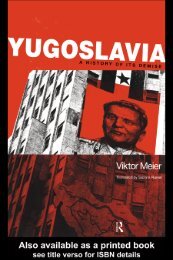Equality, Participation, Transition: Essays in Honour of Branko Horvat
Equality, Participation, Transition: Essays in Honour of Branko Horvat
Equality, Participation, Transition: Essays in Honour of Branko Horvat
Create successful ePaper yourself
Turn your PDF publications into a flip-book with our unique Google optimized e-Paper software.
2<br />
Individual Initiative, Entry and<br />
Economic Democracy *<br />
Jaroslav Vanek<br />
2.1 Introduction<br />
The orig<strong>in</strong>s <strong>of</strong> this paper go back to the reforms <strong>of</strong> President Velasco <strong>in</strong><br />
Peru over a quarter <strong>of</strong> a century ago, when both Pr<strong>of</strong>essor <strong>Horvat</strong> and<br />
myself were <strong>in</strong>vited to advise the Peruvian government on the subject<br />
<strong>of</strong> economic democracy. One <strong>of</strong> us was com<strong>in</strong>g from the Marxian tradition,<br />
the other from the tradition <strong>of</strong> the social doctr<strong>in</strong>e <strong>of</strong> the Catholic<br />
Church.<br />
The Peruvian attempt at reform and its failure, with its obstacles and<br />
myriad flaws <strong>of</strong> design and implementation, would be lengthy and difficult<br />
to describe. But there is one significant problem which arose for<br />
me then for the first time and which can be dealt with now with the<br />
h<strong>in</strong>dsight <strong>of</strong> 25 years, whose solution is <strong>in</strong>timately l<strong>in</strong>ked to the search<br />
for an optimal socio-economic system. The analysis also permits a certa<strong>in</strong><br />
surpris<strong>in</strong>g rapprochement between what we <strong>of</strong>ten refer to as the<br />
Austrian school <strong>of</strong> economics and economic democracy.<br />
The problem <strong>in</strong> Peru 25 years ago was this: the semi-primitive economy<br />
<strong>of</strong> that country then was based, besides a handful <strong>of</strong> large agrarian<br />
and m<strong>in</strong><strong>in</strong>g estates (mostly foreign owned or related), predom<strong>in</strong>antly<br />
on relatively small owner-operated firms with none or a small number<br />
<strong>of</strong> hired employees. Where there were no hired employees – basically<br />
on family firms – there was no problem, as they represented the ideal<br />
form <strong>of</strong> self-management and economic democracy. But the problem<br />
<strong>in</strong> our rather doctr<strong>in</strong>al approach to economic democracy was how to<br />
* Most <strong>of</strong> this material is repr<strong>in</strong>ted, with the Egon Sohmen Foundation’s permission,<br />
from section II <strong>of</strong> J. Vanek’s Egon-Sohmen Lecture, ‘Welfare State: Bandaid<br />
or Full Cure?’, Egon Sohmen Foundation, University <strong>of</strong> Economics and Bus<strong>in</strong>ess<br />
Adm<strong>in</strong>istration, Vienna, 15 October, 1996 (pr<strong>in</strong>ted <strong>in</strong> Germany 1997).<br />
16

















